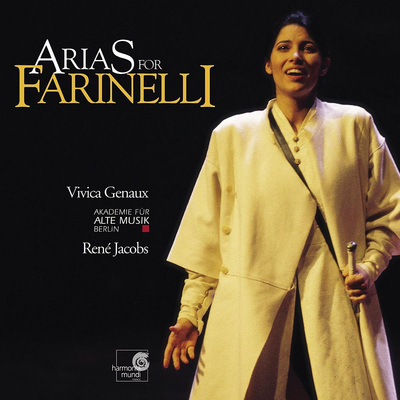
Arias for Farinelli
这张CD的曲目都是法里内利当年唱的最著名的几支咏叹调(Aria)——也是几近被遗忘的几首优美而壮丽华美的咏叹调。 做为演绎巴洛克时期作品的歌手来说,countertenor和普通女高音都有不足阉伶之处——无法做到很好的双性合一。但是Genaux纯洁而双性化的声音做到这点,让我们尽可能地想到阉伶的歌声是如何的。而她春潮般柔暖的歌喉和极佳的花腔不得不使人感到万分酥软怡人的爱意。虽然有人把她自然地联想到Cecilia Bartoli,但是较之后者,Genaux更有的是那种连绵不绝,情意万千的缠绵浪漫。 在乐队和指挥方面,Jacobs和Akademie für Alte Musik Berlin很好地配合了Genaux的演唱,受到了一致地好评。 by Allen Schrott Recording an album of arias written expressly for Farinelli, one of the most legendary castratos of the eighteenth century, is brave; his name invokes a world of superhuman vocal feats, remarkable pathos, and a uniquely strong and brilliant tone that, for obvious reasons, cannot be replicated by modern singers. But that clearly does not scare Vivica Genaux who, along with René Jacobs and the Akademie für Alte Musik Berlin, dives into Farinelli's repertory as if it were her very own. She reveals a voice capable of dizzying speed and agility, and a refreshing ability to find in the highly ornamented, expression-through-excess style that typified opera seria of the time a sincerity and musical integrity that makes a case for its wider exploration. Jacobs and the Akademie are equally impressive, playing with a rhythmic vitality and crisp ensemble that elevates their role to an equal plane with that of the voice. Inclusion of Baldassare Galuppi's Concerto à quattro in D minor -- a rare orchestral selection on a vocal recital album -- is especially interesting; although it lacks the visceral appeal of the sung selections, it showcases the ensemble to great effect. Genaux is terrific in all respects, but she really shines when the fireworks start. There are jaw-dropping passages in these arias that are impossibly intricate, often combining furious coloratura and ornament upon ornament with wide leaps and extremes of range, both high and low. Hearing her negotiate these difficulties with such clarity and confidence is awe-inspiring and fun. Especially noteworthy are "Qual guerriero in campo armato" from Idaspe, by Riccardo Broschi (Farinelli's brother) and Geminiano Giacomelli's "Quell'usignolo," from the opera Merope. Both are showpieces that very few people could sing at all, let alone so winningly.
